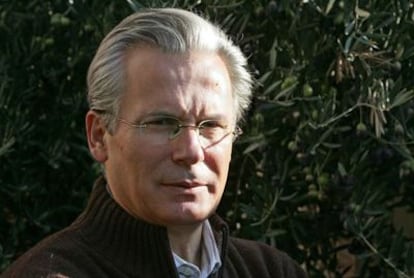Garzón: "When ETA does more, there will be compensation"
When Baltasar Garzón first began work at the High Court 22 years ago he made it "a personal aim" to finish with ETA; since then he has probably been the organization's worst enemy. In an interview with EL PAÍS, he gave his reaction to the group's Thursday announcement of a definitive end to violence.
Garzón, who is suspended from duty, awaiting trial over his investigation into Francoist crimes, was in Bogotá when he heard the news. "I felt a mixture of contained joy and doubt, because we have been in similar situations before, even though on this occasion it seems that the terrorist organization has made the decision unilaterally, without demanding anything," he says.
ETA has made this decision now because, on one hand, its terrorist actions have not had the results it was claiming, Garzón believes. "That is down to the firm action of the state, which is the government to each and every one of those who form it. Spain has combatted terrorism for many years, but the killing of Tomás y Valiente, the kidnapping of Ortega Lara [both 1996] and the killing of Miguel Ángel Blanco [in 1997] marked turning points: Spanish society passed from apparent indifference to active indignation against terrorism."
A violent split at the top is not the cause, he thinks, as ETA doesn't have a strong leadership and the leaders that remain are in favor of the decision.
As for how ETA's dissolution will now play out, he says it is too early to say, though it should not take years. "But there's no rush. The end is more difficult than the beginning. There will have to be a lot of unity and a holistic state policy. All the political groups need to be aware that it is a unique opportunity and that the time of confrontation among democrats against terrorism should have also reached its end."
No pact
What legal scope does the government have to hasten the end of ETA? "Here the big novelty is that there has been no pact, no rapprochement on the part of the Spanish government nor on the part of ETA," he says. "ETA has to submit to the action of the law, how and when they hand over their arms, which is really what ETA should have done: hand over its arms and dissolve. I imagine they are going to play around with this, but I think that little by little that the handing over of arms will happen, within the law.
"When ETA does a bit more than announce this beginning, then other compensatory measures will be able to be taken, but not before."

Tu suscripción se está usando en otro dispositivo
¿Quieres añadir otro usuario a tu suscripción?
Si continúas leyendo en este dispositivo, no se podrá leer en el otro.
FlechaTu suscripción se está usando en otro dispositivo y solo puedes acceder a EL PAÍS desde un dispositivo a la vez.
Si quieres compartir tu cuenta, cambia tu suscripción a la modalidad Premium, así podrás añadir otro usuario. Cada uno accederá con su propia cuenta de email, lo que os permitirá personalizar vuestra experiencia en EL PAÍS.
En el caso de no saber quién está usando tu cuenta, te recomendamos cambiar tu contraseña aquí.
Si decides continuar compartiendo tu cuenta, este mensaje se mostrará en tu dispositivo y en el de la otra persona que está usando tu cuenta de forma indefinida, afectando a tu experiencia de lectura. Puedes consultar aquí los términos y condiciones de la suscripción digital.








































